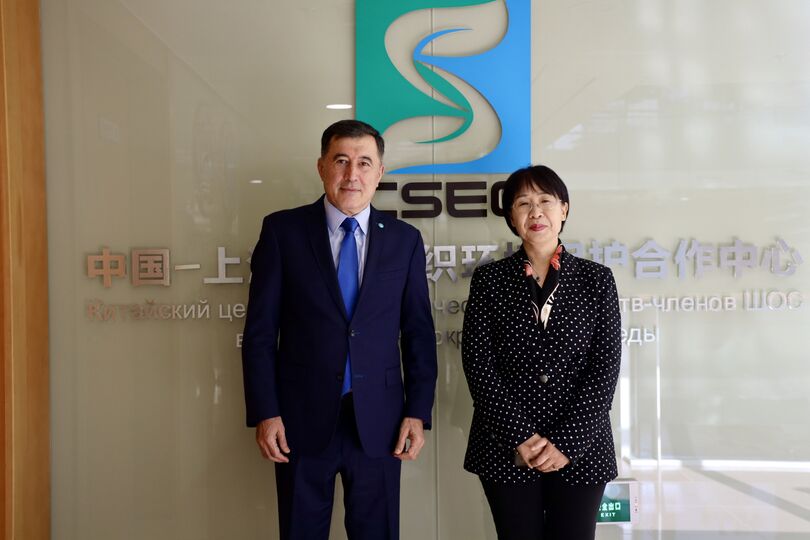On 11 December 2020, SCO Secretary-General Vladimir Norov had a meeting with Ms Zhou Guomei, Director of the China Centre for SCO Environmental Cooperation.
The SCO Secretary-General noted current economic problems in SCO countries, linked with the drying up of the Aral Sea and the melting of the Tien Shan glaciers. He discussed SCO measures to prevent environmental disasters, including the establishment of the International Fund for Saving the Aral Sea, the UN Trust Fund, the approval of the Programme for City Environmental Well-Being, the initiatives of the presidents of Uzbekistan and Tajikistan on the Green Belt project, and the creation of an international fund for saving glaciers, etc.
Taking into consideration the trans-border nature of environmental threats and the direct link between environmental security and other socio-economic and political security elements, Mr Norov made the following proposals to the Chinese party:
— explore the possibility of establishing the China-SCO demonstration zone in the area of environmental protection (for exchanging experience and implementing joint projects);
— draft a joint action plan for cooperation between the SCO Secretariat and the China Centre for SCO Environmental Cooperation;
— organise an online conference in 2021 on combating desertification in order to publicise Chinese experience in this sphere;
— prepare for publishing a collection of the best practices of SCO countries to combat desertification for the 20th anniversary of the SCO;
— hold an interactive game on the SCO's interactive environmental protection model using the SCO's youth policy platforms.
Ms Zhou Guomei noted that the melting of glaciers and the Aral Sea problem are important matters and common to all SCO countries, and that they require joint solutions.
She supported the above-mentioned initiatives and reaffirmed China's readiness to start implementing them.
She discussed the Centre's high-priority activities, as regards the implementation of international environmental conventions and support for cooperation mechanisms under environmental protection conventions, as well as efforts to study international environmental policy, and the exchange of technologies and innovations.
The Director thanked the SCO Secretariat for supporting the Centre's efforts to promote cooperation with SCO countries. In all, their representatives have attended over 20 themed seminars and training sessions.
Ms Zhou Guomei noted the importance for advancing intra-SCO cooperation on climate change and suggested organising a joint seminar on the Aral Sea problem in 2021. The event is to involve a relevant pool of experts. In this context, she said the People's Republic of China had accumulated substantial experience in planting trees and shrubs and combating desertification by using modern technologies and involving a number of specialised spatial planning companies in designing the urban infrastructure, using space satellites to monitor the environment and other areas.
In conclusion, Ms Zhou Guomei invited the SCO Secretariat to take part in the 13th conference to monitor compliance with the Convention on Biological Diversity of 5 June 1992, scheduled to be held in Kunming next year.
The China Centre for SCO Environmental Cooperation, hereinafter referred to as Centre, was established in May 1997 and is affiliated with China's Ministry of Ecology and Environment.
While fulfilling its functional duties, the Centre facilitates the implementation of the provisions of the Montreal Protocol, the Stockholm Convention, the Convention on Biological Diversity, including the appended Protocol on Environmental Security, the Nagoya Protocol and the Minamata Convention on Mercury. The Ministry's Foreign Economic Cooperation Office (FECO) has drafted a system of activities encompassing advanced research, talks, the signing of documents, introduction and assessment. Its work is highly appreciated both within the country and abroad. The organisation has received numerous awards and won the recognition of the international community.
The Centre cooperates with the World Bank, the Asian Development Bank, UN Family agencies, as well as with Italy, the European Union, Germany, Sweden, the United States and over ten other countries and regions, in the bilateral and multilateral format.
